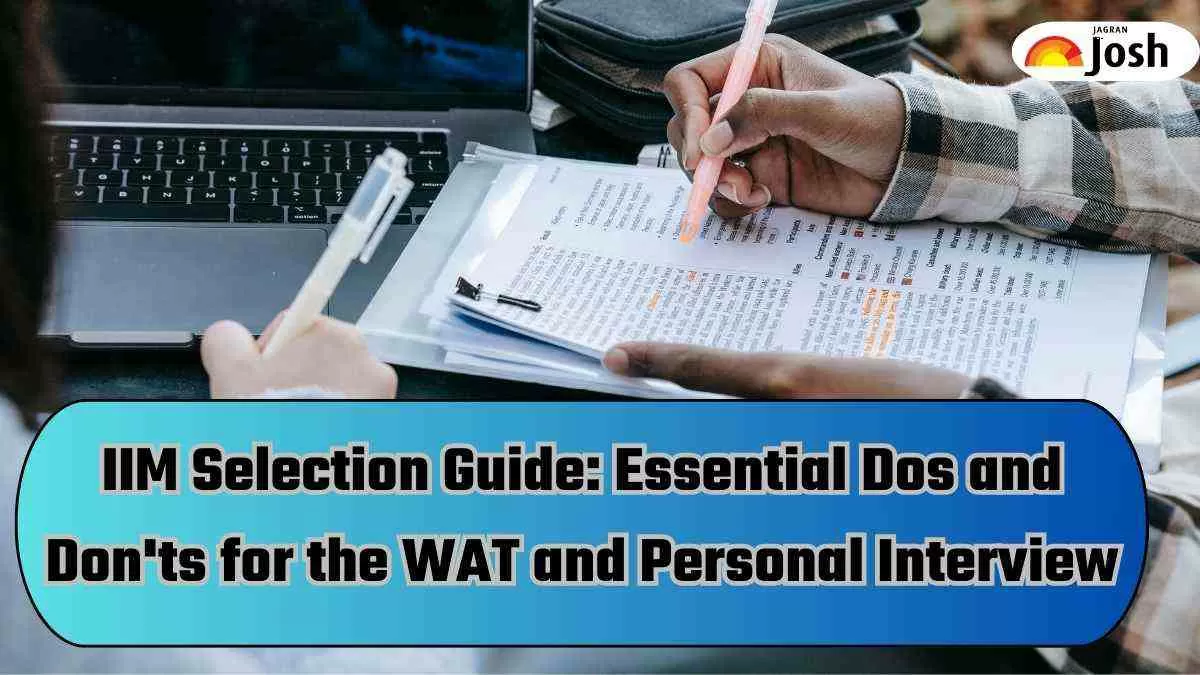Once the CAT scores are released, B-school aspirants begin their preparation for the next stage with determination. This phase involves two major challenges: the Written Ability Test (WAT) and the Personal Interview (PI).
Also Check: IIM Ranchi officially launches the Executive MBA Winter Batch 2025-27
ABOUT WAT
The Writing Ability Test (WAT) is a brief essay exercise used by IIMs as part of the selection process. Candidates are given a topic and are required to write a clear, well-structured essay in 20 to 30 minutes, covering subjects like current affairs, abstract concepts, social issues, or business scenarios. A well-organised essay typically includes an introduction, body, and conclusion.
KEY STRATEGIES
- CLARIFY THE TOPIC: Ensure you fully understand the topic before starting to write. If you're uncertain, take some extra time to think it over.
- TIME MANAGEMENT: Allocate up to 40% of your time for planning your essay. Note down key points and apply Key Word Analysis (KWA) and SPELT analysis (Social, Political, Economic, Legal, Technological).
- PRIORITISE: Arrange your points in order of importance, making sure to address the top three key ideas.
- FOCUS ON CONTENT, NOT JUST LANGUAGE: The WAT isn't just about testing your English skills. Clear, straightforward writing works best—don't worry about achieving perfect language.
- CITE SOURCES: Add references from research papers or respected figures to boost the credibility of your essay.
- REGULAR READING: Cultivate a reading habit to expand your knowledge and enhance your vocabulary.
- DEVELOP A DISTINCT PERSPECTIVE: To differentiate yourself, offer a unique insight or viewpoint that makes your essay stand out from others on similar topics.
The IIM WAT round is a critical component of the selection process, carrying significant weight. It's essential to ensure that no mistakes are made and that everything is covered in your WAT. To help with this, avoid the following common mistakes:
- EXCEEDING THE WORD LIMIT: Ensure you stay within the specified word count.
- IRRELEVANT CONTENT: Keep your writing concise and focused; avoid unnecessary details.
- INTRODUCTION AND CONCLUSION: Keep them concise and focus more on elaborating the body with strong arguments and examples.
- LACK OF CITATION: Always give credit to the sources of quotes or borrowed content.
- GRAMMATICAL ERRORS: Review your essay for any grammar, spelling, or punctuation mistakes.
- COMPLEX VOCABULARY: Refrain from using difficult words; focus on clarity and making your point easy to understand.
- FALSE CONTENT: Use real-life examples instead of made-up ones.
ABOUT PERSONAL INTERVIEW
A personal interview is a face-to-face interaction between an applicant and a panel of interviewers. The primary objective is to evaluate the candidate's fit for the MBA program, looking beyond just academic qualifications.
CRUCIAL AREAS TO FOCUS ON
- Be entirely truthful; interviewers can quickly detect dishonesty.
- Remain confident if interviewers try to confuse you with their expressions. Support your responses with relevant examples.
- Avoid contradicting yourself; stand by your statements.
- Be familiar with your CV and prepared to discuss your experiences and accomplishments in detail.
- Rehearse common interview questions such as "Tell me about yourself" and "Why do you want to pursue an MBA?" to build your confidence.
- Participate in mock interviews to enhance your communication skills and handle stress better; ask for feedback from mentors or peers.
- Maintaining positive eye contact is an effective interview strategy. It shows confidence and self-esteem—traits that interviewers appreciate. Keep eye contact during the greeting and throughout the conversation to show engagement and assurance.
- Your body language also reflects confidence. Sit upright, maintain a friendly expression, and exude self-assurance.
- Applicants should dedicate time to research the esteemed institution they are targeting, along with the specific MBA program.
- At the end, ask thoughtful questions, express your gratitude to the interviewer, and inquire about the next steps in the process.
Also Check:
